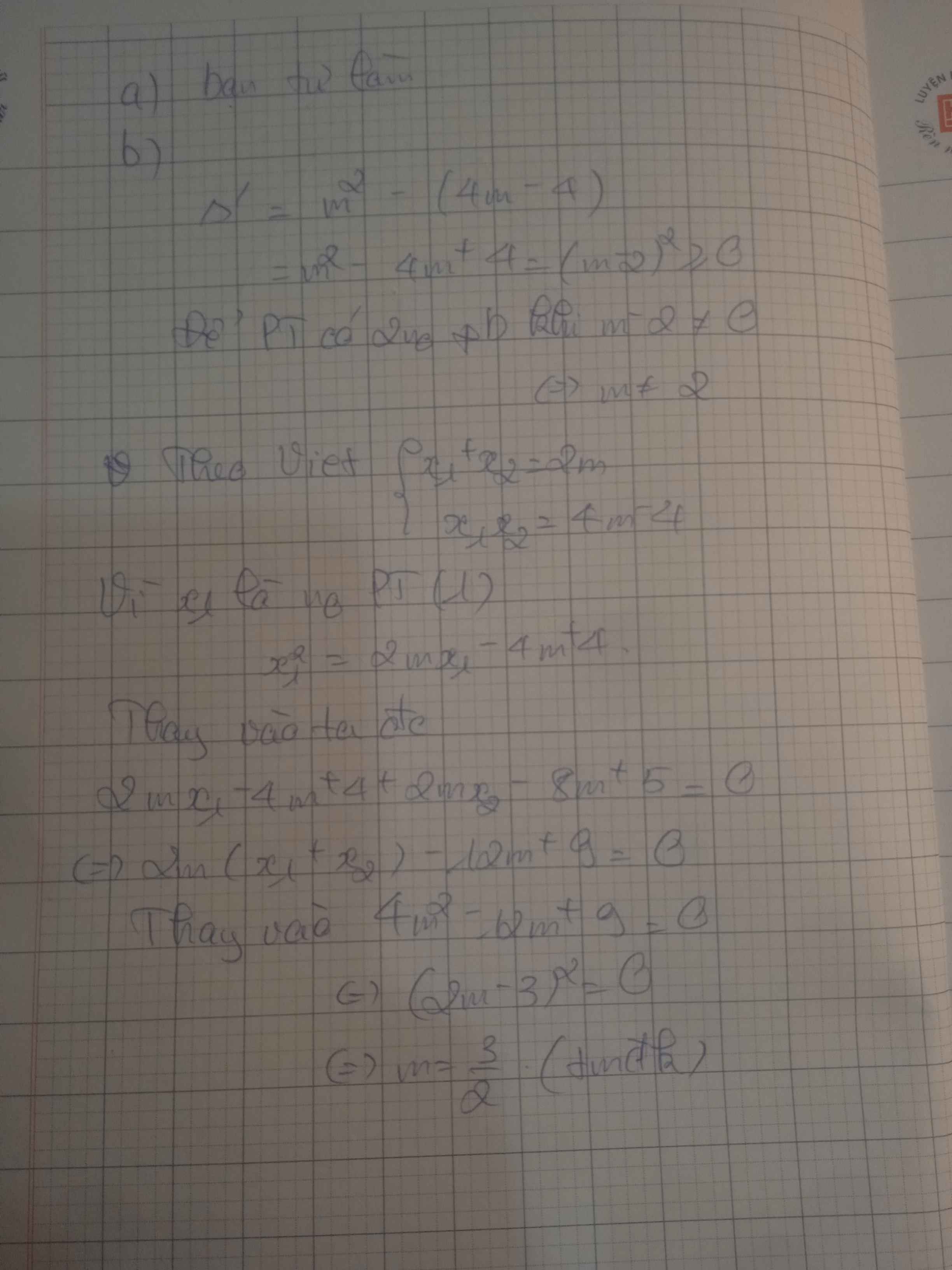Hãy nhập câu hỏi của bạn vào đây, nếu là tài khoản VIP, bạn sẽ được ưu tiên trả lời.

a) Thay m=0 vào phương trình (1), ta được:
\(x^2-2\cdot\left(0-1\right)x+0^2-3m=0\)
\(\Leftrightarrow x^2+2x=0\)
\(\Leftrightarrow x\left(x+2\right)=0\)
\(\Leftrightarrow\left[{}\begin{matrix}x=0\\x+2=0\end{matrix}\right.\Leftrightarrow\left[{}\begin{matrix}x=0\\x=-2\end{matrix}\right.\)
Vậy: Khi m=0 thì S={0;-2}

\(x^2+\left(4m+1\right)x+2\left(m-4\right)=0\)
\(\Delta=\left(4m+1\right)^2-4\cdot1\cdot2\left(m-4\right)=16m^2+8m+1-8m+32=16m^2+33\ge33>0\forall m\)
\(\Leftrightarrow\left\{{}\begin{matrix}x_1=\dfrac{-\left(4m+1\right)+\sqrt{16m^2+33}}{2}\\x_2=\dfrac{-\left(4m+1\right)-\sqrt{16m^2+33}}{2}\end{matrix}\right.\)
Mà: \(x_2-x_1=17\)
\(\Leftrightarrow\dfrac{-\left(4m+1\right)-\sqrt{16m^2+33}}{2}-\dfrac{-\left(4m+1\right)+\sqrt{16m^2+33}}{2}=17\)
\(\Leftrightarrow\dfrac{-\left(4m+1\right)-\sqrt{16m^2+33}+\left(4m+1\right)-\sqrt{16m^2+33}}{2}=17\)
\(\Leftrightarrow\dfrac{-2\sqrt{16m^2+33}}{2}=17\)
\(\Leftrightarrow\sqrt{16m^2+33}=-17< 0\)
Vậy không có m thỏa mãn

\(\Delta=\left(-m\right)^2-2.1.\left(m-1\right)\\ =m^2-2m+1\\ =\left(m-1\right)^2\)
Phương trình có hai nghiệm phân biệt :
\(\Leftrightarrow\Delta>0\\ \Rightarrow\left(m-1\right)^2>0\\ \Rightarrow m\ne1\)
Theo vi ét :
\(\Leftrightarrow\left\{{}\begin{matrix}x_1+x_2=m\\x_1x_2=m-1\end{matrix}\right.\)
\(x^2_1+x^2_2=x_1+x_2\\ \Leftrightarrow x^2_1+x^2_2=m\\ \Leftrightarrow\left(x^2_1+2x_1x_2+x_2^2\right)-2x_1x_2=m\\ \Leftrightarrow\left(x_1+x_2\right)^2-2x_1x_2-m=0\\ \Leftrightarrow m^2-2\left(m-1\right)-m=0\\ \Leftrightarrow m^2-2m+2-m=0\\ \Leftrightarrow m^2-3m+2=0\\ \Leftrightarrow\left[{}\begin{matrix}m=1\left(loại\right)\\m=2\left(t/m\right)\end{matrix}\right.\)
Vậy \(m=2\)

a) Với m= 2, ta có phương trình: x 2 + 2 x − 3 = 0
Ta có: a + b + c = 1 + 2 − 3 = 0
Theo định lý Viet, phương trình có 2 nghiệm:
x 1 = 1 ; x 2 = − 3 ⇒ S = 1 ; − 3 .
b) Chứng minh rằng phương trình luôn có nghiệm ∀ m .
Ta có: Δ ' = m − 1 2 − 1 + 2 m = m 2 ≥ 0 ; ∀ m
Vậy phương trình luôn có nghiệm ∀ m .
c) Theo định lý Viet, ta có: x 1 + x 2 = − 2 m + 2 x 1 . x 2 = 1 − 2 m
Ta có:
x 1 2 . x 2 + x 1 . x 2 2 = 2 x 1 . x 2 + 3 ⇔ x 1 . x 2 x 1 + x 2 − 2 = 6 ⇒ 1 − 2 m − 2 m + 2 − 2 = 6 ⇔ 2 m 2 − m − 3 = 0
Ta có: a − b + c = 2 + 1 − 3 = 0 ⇒ m 1 = − 1 ; m 2 = 3 2
Vậy m= -1 hoặc m= 3/2

a: Thay m=-5 vào (1), ta được:
\(x^2+2\left(-5+1\right)x-5-4=0\)
\(\Leftrightarrow x^2-8x-9=0\)
=>(x-9)(x+1)=0
=>x=9 hoặc x=-1
b: \(\text{Δ}=\left(2m+2\right)^2-4\left(m-4\right)=4m^2+8m+4-4m+16=4m^2+4m+20>0\)
Do đó: Phương trình luôn có hai nghiệm phân biệt
\(\dfrac{x_1}{x_2}+\dfrac{x_2}{x_1}=-3\)
\(\Leftrightarrow x_1^2+x_2^2=-3x_1x_2\)
\(\Leftrightarrow\left(x_1+x_2\right)^2+x_1x_2=0\)
\(\Leftrightarrow\left(2m+2\right)^2+m-4=0\)
\(\Leftrightarrow4m^2+9m=0\)
=>m(4m+9)=0
=>m=0 hoặc m=-9/4

Δ=5^2-4(m-3)
=25-4m+12=-4m+27
Để phương trình có 2 nghiệm thì -4m+27>=0
=>m<=27/4
Theo đề, ta có: x1-2<0 và x2-2>0
=>(x1-2)(x2-2)<0
=>x1x2-2(x1+x2)+4<0
=>m-3-2*(-5)+4<0
=>m+1+10<0
=>m<-11

Để pt có hai nghiệm pb \(\Leftrightarrow\Delta>0\)\(\Leftrightarrow4-4\left(m-1\right)>0\)\(\Leftrightarrow2>m\)
Theo viet có:\(\left\{{}\begin{matrix}x_1+x_2=2\\x_1x_2=m-1\end{matrix}\right.\)
Có \(x_1^2+x_2^2-3x_1x_2=2m^2+\left|m-3\right|\)
\(\Leftrightarrow\left(x_1+x_2\right)^2-5x_1x_2=2m^2+\left|m-3\right|\)
\(\Leftrightarrow4-5\left(m-1\right)=2m^2+\left|m-3\right|\)
\(\Leftrightarrow2m^2+\left|m-3\right|-9+5m=0\) (1)
TH1: \(m\ge3\)
PT (1) \(\Leftrightarrow2m^2+m-3-9+5m=0\)
\(\Leftrightarrow2m^2+6m-12=0\)
Do \(m\ge3\Rightarrow\left\{{}\begin{matrix}6m-12\ge6>0\\2m^2>0\end{matrix}\right.\)
\(\Rightarrow2m^2+6m-12>0\)
=>Pt vô nghiệm
TH2: \(m< 3\)
PT (1)\(\Leftrightarrow2m^2-\left(m-3\right)-9+5m=0\)
\(\Leftrightarrow2m^2+4m-6=0\) \(\Leftrightarrow2m^2-2m+6m-6=0\)
\(\Leftrightarrow2m\left(m-1\right)+6\left(m-1\right)=0\)\(\Leftrightarrow\left(2m+6\right)\left(m-1\right)=0\)
\(\Leftrightarrow\left[{}\begin{matrix}m=-3\\m=1\end{matrix}\right.\) (Thỏa)
Vậy...

\(x^2-2\left(2m+1\right)x+4m^2+4m=0\)
Để pt có hai ng pb\(\Leftrightarrow\Delta>0\)
\(\Leftrightarrow4>0\left(lđ\right)\)
\(\Rightarrow\)Pt luôn có hai ng pb với mọi m
\(\left\{{}\begin{matrix}x_1=\dfrac{2\left(2m+1\right)+\sqrt{4}}{2}=2m+2\\x_2=\dfrac{2\left(2m+1\right)-\sqrt{4}}{2}=2m\end{matrix}\right.\)
Có \(\left|x_1-x_2\right|=x_1+x_2\)
\(\Leftrightarrow\left|2m+2-2m\right|=2m+2+2m\)
\(\Leftrightarrow2=4m+2\)
\(\Leftrightarrow m=0\)
Vậy...



Phương trình (1) có Δ=9+8m2>0Δ=9+8m2>0 với mọi m nên (1) luôn có 2 nghiệm phân biệt.
Gọi hai nghiệm đó là x1,x2,x1,x2, theo định lý Viet ta có: {x1+x2=3x1x2=−2m2{x1+x2=3x1x2=−2m2
Điều kiện x12=4x22⇔(x1−2x2)(x1+2x2)=0⇔[x1=2x2x1=−2x2x12=4x22⇔(x1−2x2)(x1+2x2)=0⇔[x1=2x2x1=−2x2
Với x1=2x2,x1=2x2, giải hệ {x1+x2=3x1=2x2⇔{x1=2x2=1⇒2=−2m2⇔m∈∅⇒{x1+x2=3x1=2x2⇔{x1=2x2=1⇒2=−2m2⇔m∈∅⇒ không tồn tại m.
Với x1=−2x2,x1=−2x2, giải hệ {x1+x2=3x1=−2x2⇔{x1=6x2=−3⇒−18=−2m2⇔m=±3{x1+x2=3x1=−2x2⇔{x1=6x2=−3⇒−18=−2m2⇔m=±3
Vậy m=±3m=±3 thỏa mãn yêu cầu bài toán.
Phương trình (1) có Δ=9+8m2>0Δ=9+8m2>0 với mọi m nên (1) luôn có 2 nghiệm phân biệt.
Gọi hai nghiệm đó là x1,x2,x1,x2, theo định lý Viet ta có: {x1+x2=3x1x2=−2m2{x1+x2=3x1x2=−2m2
Điều kiện x12=4x22⇔(x1−2x2)(x1+2x2)=0⇔[x1=2x2x1=−2x2x12=4x22⇔(x1−2x2)(x1+2x2)=0⇔[x1=2x2x1=−2x2
Với x1=2x2,x1=2x2, giải hệ {x1+x2=3x1=2x2⇔{x1=2x2=1⇒2=−2m2⇔m∈∅⇒{x1+x2=3x1=2x2⇔{x1=2x2=1⇒2=−2m2⇔m∈∅⇒ không tồn tại m.
Với x1=−2x2,x1=−2x2, giải hệ {x1+x2=3x1=−2x2⇔{x1=6x2=−3⇒−18=−2m2⇔m=±3{x1+x2=3x1=−2x2⇔{x1=6x2=−3⇒−18=−2m2⇔m=±3
Vậy m=±3m=±3 thỏa mãn yêu cầu bài toán.